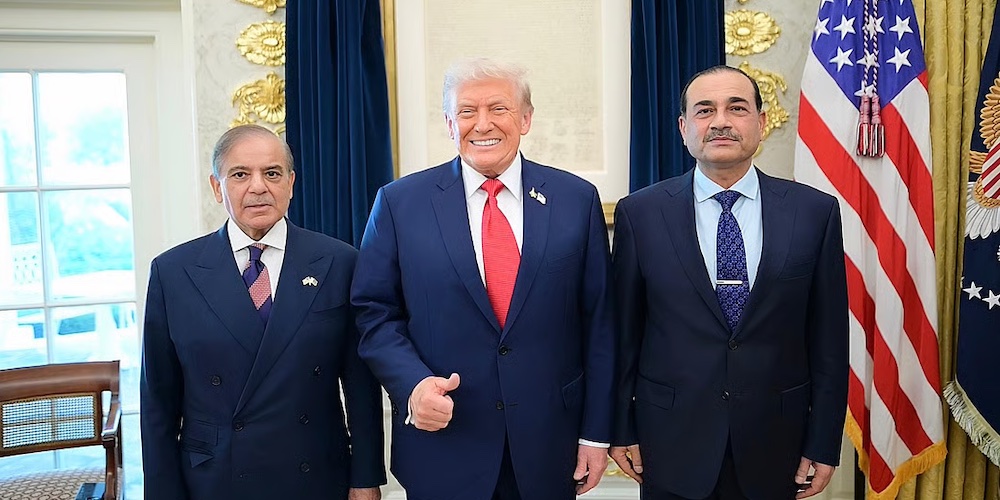MONKEYS’ SOMERSAULT

WE need to take note of two monkeys who are adept at rapid somersaults because they affect us directly.
There is a saying in Gujarati that the three most unpredictable things in the world are raja, vaja and vandra, which translates to king, musical instrument and monkey.
Consider President Donald Trump, who has been imposing tariffs on India almost daily. By now, it is clear that, besides his rampaging diplomacy, he is acting out of a personal pique because India does not accept that he ended the India-Pakistan conflict and that India should endorse his getting a Nobel Prize for peace.
India has not responded to his demand, which he has made at least 20 times – some say even more. But Pakistan has happily agreed.
Nobody is fooled into thinking that Nobel is the sole reason, repeated at the United Nations General Assembly last week, along with six other conflicts he claims to have resolved. They are there, for the world to suffer them.
Should personal whims determine the diplomacy of the head of the world’s most powerful leader, who wants to bend the world the way he wants? But that is ‘Trumpism’, MAGA, and it is causing revulsion in the US as well.
Consider his latest somersault, away from India. Till only the other day, Indian PM Modi was “a great guy”. Now, this honour has been passed on to PM Shehbaz Sharif and the Pakistan Army Chief, Field Marshal Asim Munir.
He has forgotten that Osama bin Laden, who had triggered 9/11, was found in a safe house in Abbottabad, on Pakistani territory. And that 9/11 itself killed thousands of Americans.
Is the US preparing for a change in its South Asia policy?
If so, Trump has virtually ended over two decades of alliance with India, pursued by five presidents, including himself.
Trump has opened a new chapter in ties with Pakistan. Not that the USA ever gave up on Pakistan, its original ally in South Asia, which was a member of CENTO and SEATO, the US-led military alliances. Ready to be a vassal, which India would not, Pakistan provided the US access to China, but before that, it spied for the US against China. Today, that chapter is history.
When the US withdrew from Afghanistan in 2021, then-Pakistan PM Imran Khan had called it ‘liberation’. He ended up being ‘liberated’ – voted out of power — eventually, in jail. The military that had helped him to power did not like his “monkey business”.
Pakistan’s Defence Minister Khawaja Asif has said that the US made his country do “dirty work” in Afghanistan twice. Both times it was done by “military dictators”, Generals Ziaul Haq and Pervez Musharraf. Although Asif’s government has democratic pretensions, he should be looking over his shoulder to see if the all-powerful Field Marshal is listening to his anti-military harangues.

But what about Trump’s own past fulminations about Pakistan’s “double-dealings” with the US by hosting and arming the Afghan Taliban? He has conveniently forgotten that this eventually led to America’s exit from Afghanistan, which was more humiliating than Vietnam. He blames predecessor Biden, but who signed the Doha Pact that gave the Taliban a carte blanche?
Unhappy with Pakistan, successive US governments wanted India to invest in Afghanistan. India did that to help the Afghans due to its historical ties and to keep a foothold in the extended neighbourhood. Today, it is ready to receive Amir Khan Muttaqi, the first-ever Afghan Taliban leader on its soil, and has joined a global somersault. Nobody is shedding even crocodile’s tears for the suffering Afghan women.
All is fair in love and war – and terrorism. Trump has added trade to this list.
So, we have two meetings in White House hosted by Trump for Sharif and Munir. Munir displayed samples of rare earth that the US is coveting, more so since China has announced restrictions. Will China tolerate this “monkey business”?
Meanwhile, Saudi Arabia and Pakistan have struck a military alliance. Whether the Trump administration sought to influence it, we do not know. But it could not be unaware.
What was cooked during the White House meetings is not known. Is the US seeking Pakistan’s help to return to Afghanistan so that America can block the Chinese expansion? Or is it to confront Iran, America’s old adversary, a Shia nation, with the Saudi-Pak alliance of the Sunnis?
India needs to worry because Bangladesh, its most ‘friendly’ neighbour till recently, has turned hostile. Trump, by the way, threw a reception for Muhammed Yunus, who heads Bangladesh’s caretaker government.
Fingers have been pointed at the likely American role in simulating the change of August 2024 and putting Yunus in power. Since then, hundreds of American soldiers have been on Bangladesh’s border with Myanmar, now ruled by a pro-China military junta. Pakistan is back in its erstwhile eastern province after 53 years, and China is Bangladesh’s largest trade and arms supplier.
Sorry, but this is India-centric sentiment. None of these events can cause comfort for India as its north-eastern region, once relatively safe, is now vulnerable to a likely resurgence of Islamist forces. Besides the west and the north, India has a front in the east to manage.
While all this is already happening or could occur in its immediate neighbourhood, India needs to stay alert about the political, economic, diplomatic and military impact. Is the South Asian region up for realignment?
Trump’s angry reaction to Modi attending the SCO Summit in China and meeting with Putin and Xi, perhaps, explains his subsequent actions and the chorus of criticism from Western leaders.
Has the West had enough of India as the ‘pivot’ of its quest to counter China? If it thinks India is not a reliable ally, what could be the new line-up?
All this, and now the two monkeys’ somersaults isolate India. This is its biggest challenge in the new century, with consequences for many years ahead.


